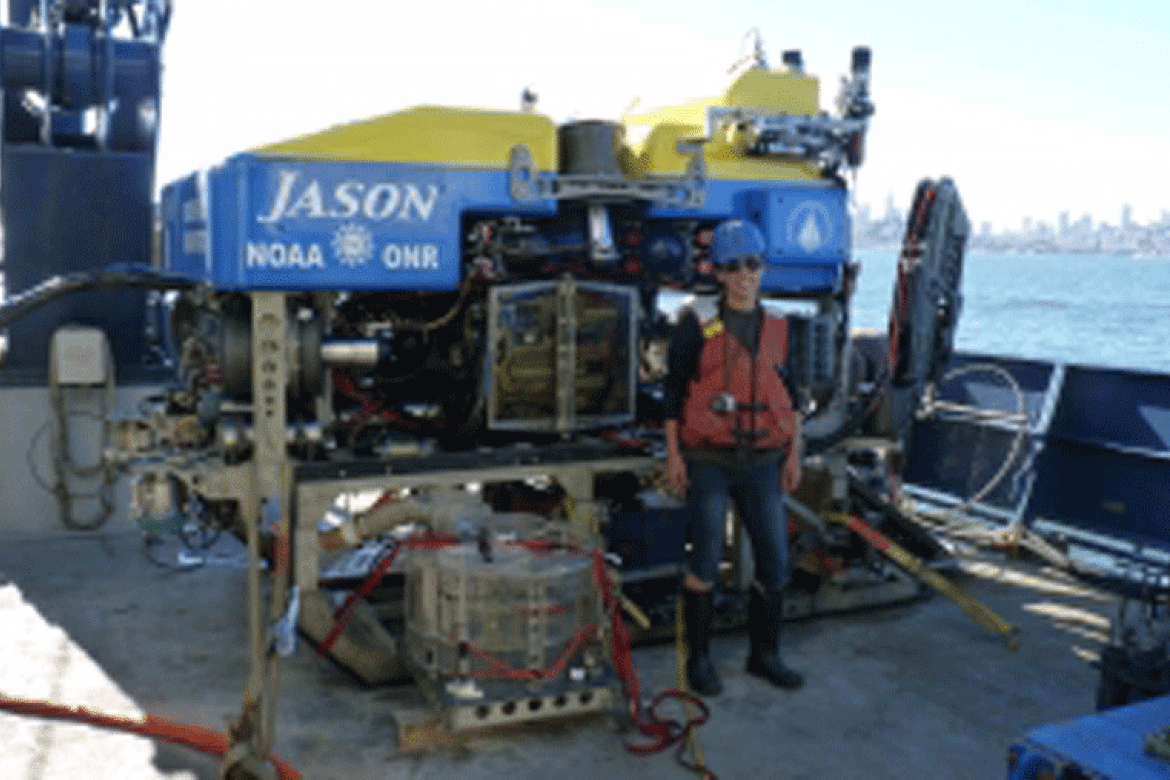MHC alum finds microbial gold in ocean muck

Alum Veronika Kivenson’s NSF grant allows her to use a supercomputer to examine how microbes metabolize pollutants found in marine sediment.
Mount Holyoke College’s Veronika Kivenson FP’13, now a doctoral candidate at the University of California, Santa Barbara, has been awarded a National Science Foundation grant to use the agency’s Extreme Science and Engineering Discovery Environment, known as the XSEDE, to examine the biodiversity in specific marine ecosystems.
Valued at more than $53,000, the grant gives Kivenson more than 265,000 hours of access to the XSEDE, which is a supercomputer system that allows scientists to analyze complex biological data.
As co-principal investigator of the project, Kivenson is looking at microbial communities in the ocean. The microbes are able to process certain chemicals, such as methane, by acting as an environmental bio-filter. Kivenson and her colleagues want to identify these microbes and learn how they work.
Kivenson collected the data in 2013 when she was starting graduate school and joined a research expedition in the San Pedro Basin off Santa Monica, California. The research team used an underwater robot to collect samples of microbes and then extracted DNA in the lab. Analyzing this data is where the XSEDE comes in.
The power of the supercomputer allows Kivenson to process huge amounts of data at a fast rate, she said.
“Some of these jobs can take hundreds of hours because this data is so demanding,” said Kivenson. “We’re attempting to reconstruct genomes of novel microorganisms, so this process is super-complex. The supercomputer lets me run things more quickly.”
A graduate of Bunker Hill Community College, Kivenson came to Mount Holyoke as a Frances Perkins Scholar and one of the College’s first Scholarships in STEM program scholars. The grant, awarded by the National Science Foundation to Mount Holyoke professors Sarah Bacon in biology, Darby Dyar, astronomy, and Becky Wai-Ling Packard, psychology and education, was designed to cultivate the transfer pathway for women pursuing STEM fields — a valuable and often underrepresented group in STEM nationally.
“Veronika arrived on day one filled with intellect, curiosity and generosity,” said Packard, who is also director of the Harriet L. and Paul M. Weissman Center for Leadership and co-principal investigator of the S-STEM program award. “Veronika has brought Mount Holyoke an incredible amount of pride.”
Kivenson applied to the College with the intention of majoring in biochemistry (she minored in environmental studies) and she credits Mount Holyoke with preparing her for this latest journey.
“It was challenging coming in as a third-year student, but I’m grateful because that process was good preparation for all this,” Kivenson said. “I went in knowing that’s what I wanted to do and the College’s Frances Perkins Program is set up in a way that allows students to succeed.”
Succeed she did, said Carolyn Dietel, director of the Frances Perkins Program, which is open to women 25 years and older who have experienced an interruption in their education.
“It didn’t take long after transferring for Veronika to tap into the resources here and to benefit from the strong advising she received from faculty,” Dietel said. “The FP community helped instill her confidence and provided strong support as she pursued her goals.”
Kivenson is excited to see where this research project takes her and intends to continue working in bioinformatics after she completes graduate school.
“I feel pretty lucky that I get to do this cool stuff, and I love talking about it too!” she said.
Where will your passions take you? Visit.